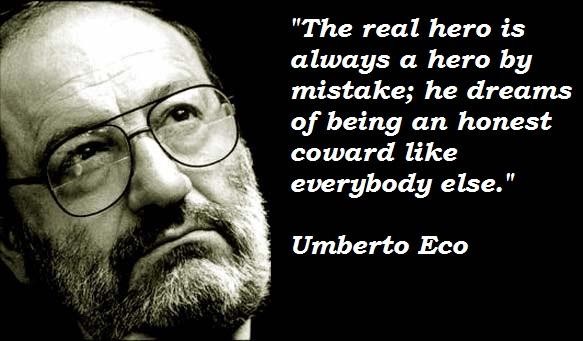
Umberto Eco was tired when I met him in 2011. At 80, he was in the middle of an arduous 20-day tour to promote his novel The Prague Cemetery, and he was sagging. I didn’t much like the novel we were there to discuss – it seemed to me that his complex, conspiracy-based fictions had become formulaic – and we had some comic misunderstandings based on his unfamiliarity with idiomatic English. “What is a ‘return to form’?” And yet the meeting was a memorable one, and I knew I’d been fortunate to encounter him, even this late in his career – a hugely successful writer but, more interestingly, a rare example of the public intellectual.
His conversation tended to proceed by bursts of lightning. From the dense clouds – we tried to get to grips with The Prague Cemetery but the will was weak – he would suddenly produce a glorious, shimmering aperçu. “Italy is not an intellectual country,” he told me as we discussed Silvio Berlusconi’s political success. “On the subway in Tokyo everybody reads. In Italy, they don’t. Don’t evaluate Italy from the fact that it produced Raphael and Michelangelo.”
The key to his career was that fame came to him relatively late: his bestseller The Name of the Rose was published in 1980, when he was 48 and established as a professor of semiotics at the University of Bologna. He wrote the book, a murder mystery set in a 14th-century monastery, at the behest of an Italian publisher looking to publish a series of short thrillers. Eco, who always had a fondness for writing literary spoofs, accepted because he said he “felt like poisoning a monk”.
In an echo of Beethoven, who, commissioned to produce a waltz on a rather banal musical theme, conjured up the vast and complex Diabelli Variations, Eco wrote a 500-page behemoth that managed, as publicists might say, to marry Borges with Conan Doyle, a crime procedural encased in all manner of philosophical reflection and literary game-playing. The book proved a phenomenon, selling 10m copies in 30 languages and becoming a successful (though far more linear) film in 1986, with Sean Connery as the Holmesian monk-detective William of Baskerville.
Eco’s later novels, including Foucault’s Pendulum (1988), The Island of the Day Before (1994) and Baudolino (2000), also sold well and he could have given up the day job. But he never did. “I am a philosopher,” he insisted. “I write novels only on the weekends.”
He wrote half a dozen novels, but his works on semiotics, critical theory and aspects of philosophy (his earliest academic training was in medieval philosophy) are close to 10 times that number. He was one of those figures, not unfamiliar in France or Italy, who is hard to imagine in the Anglo-Saxon world: interested in everything; not bothered about demarcations of posh or pop (as a semiotician, he thought everything could be decoded), immersed in Borgesian puzzles and literary jokes, and able to be at the same time both funny and deadly serious about them. Italians are perhaps better than most at understanding that life is a divine comedy: respect the divinity, but never lose sight of the essential comedy.
I asked Eco whether it bothered him that some critics were sniffy about his later novels, and that sales never quite matched his first blockbuster. “You are always shocked by how different critics’ opinions are,” he told me. “I think a book should be judged 10 years later, after reading and rereading it. I was always defined as too erudite and philosophical, too difficult. Then I wrote a novel that is not erudite at all, that is written in plain language, The Mysterious Flame of Queen Loana, and among my novels it is the one that has sold the least. So probably I am writing for masochists. It’s only publishers and some journalists who believe that people want simple things. People are tired of simple things. They want to be challenged.”
The key, in taking stock of his 60-year career, will be putting the fictions in context. Do not trust obituaries that emphasise “the author of The Name of the Rose” to the exclusion of his other personae. His novels were a relatively small part of his output, and his contributions as critic, editor, literary theorist and all-round provocateur should not be forgotten. He was fascinated by – and wanted to look afresh at – everything. Nothing was sacrosanct. The society in which he had grown up had been torn apart by the second world war, and he sought to understand why. That was the key to his leftwing politics and to his restless intellectual wanderings. Perhaps the Anglo-Saxon literary and intellectual world is safer and more self-contained because it did not suffer that mid-century catastrophe.
“Sometimes I say I hate The Name of the Rose,” he told me, “because the following books maybe were better. But it happens to many writers. Gabriel García Márquez can write 50 books, but he will be remembered always for Cien Años de Soledad [One Hundred Years of Solitude]. Every time I publish a new novel, sales of The Name of the Rose go up. What is the reaction? ‘Ah, a new book of Eco. But I have never read The Name of the Rose.’ Which, by the way, costs less because it is in paperback.” He laughed, as, despite his fatigue, he did many times in the course of our conversation. Eco was an intellectual who wore his great learning lightly. Life, like fiction, was an endlessly absorbing game.
http://www.theguardian.com/books/2016/feb/20/umberto-eco-fiction-intellectual

No hay comentarios:
Publicar un comentario